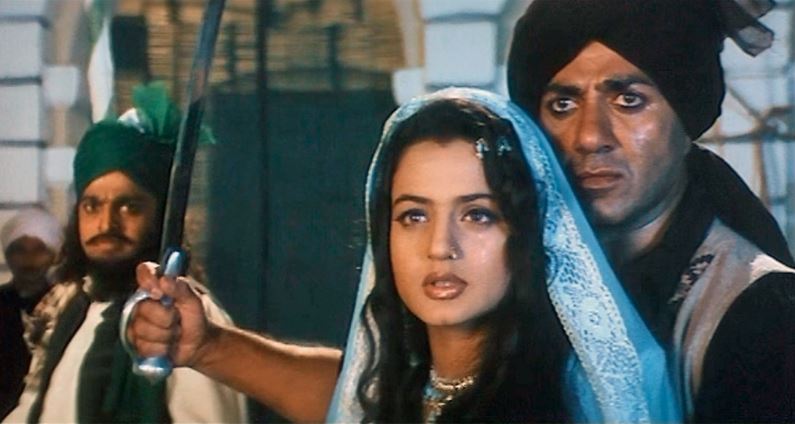Gone are the days when the calls to maintain the nauseating secularism of India would be blared day and night, ignoring the dark realities due to which millions of Hindus and Sikhs were kicked out of their homes overnight, millions of kids become orphans and millions of women were raped. 20 years ago, one such movie demolished the narrative against many odds and showed the stark reality of India’s partition, without taking many creative liberties.
This was Anil Sharma’s ‘Gadar – Ek Prem Katha’. Based around the partition of our country, this movie starred Sunny Deol, Amisha Patel, and Amrish Puri in lead roles. The movie released on the same day as the Oscar-nominated ‘Lagaan – Once Upon a Time in India’, and yet it was extremely successful, earning the status of an ‘All Time Blockbuster’. Moreover, this was one of the rare films, that portrayed the partition of India as it was, and yet, it was extremely successful in all its entirety.
Films about the partition of India are as old as the sunrise in the east. It all began with Yash Chopra’s debut film ‘Dhool ka Phool’ which released in 1959. However, instead of portraying the partition that was a greedy exercise of Muslims usurping the lawfully entitled land of the Sikhs and the Hindus, the movie showed Hindus as cruel, barbaric humans who exercised cruel deeds over hapless Muslims.
What began as an aberration in ‘Dhool ka Phool’ turned into a classic example of Stockholm syndrome, where despite knowing who is the actual culprit, the Muslims were deliberately portrayed as the victims in almost every movie related to the partition. Be it the M S Sathyu directed ‘Garam Hava’, or the Deepa Mehta directed ‘1947 Earth’, the partition was almost portrayed as the inevitable result of the excesses of the Hindus. Thankfully, ‘Kalank’ didn’t release at this time, otherwise, it would have been a classic example of how to make Hindus deliberately responsible for the partition.
One such movie, which even though pathetic, had the potential to be brilliant, was the Kamal Haasan directed ‘Hey Ram’. It was the first film that portrayed the barbarism associated with the direct-action day riots without any malice. However, in an attempt to balance himself, Kamal Haasan portrayed the aggrieved Hindus as barbaric fundamentalists, which was where he completely lost the plot.
It was here that ‘Gadar’ had struck a different chord. For the first time, a movie didn’t try to mollycoddle the minority sentiments, instead, it hit them hard on the head. The opening scenes were so unblemished, and the way the director showed the sufferings of the Hindus, the Sikhs, as well as the Muslims during the partition, without any special bias for any of them, was something that was actually missing in the previous movies. Of course, the movie did have its fair share of commercial potboilers, but even for its era, it was surprisingly realistic and engaging.
Sunny Deol is well known for his action prowess. However, he mesmerised us with the sweet personality of Tara Singh in this movie. Amisha Patel, just a movie old, was equally likeable as Sakina. Even Vivek Shauq provided the perfect comic relief as Tara’s assistant, Darmiyan Singh. Amrish Puri was both likeable and repressive as the concerned but barbaric Ashraf Ali, and even today, nobody can say that they hate the music of ‘Gadar – ek Prem Katha’. Only an idiot would claim he/she hates ‘Udd Ja Kaale Kaanwan’ or ‘Main Nikla Gaddi Leke’.
When ‘Gadar’ released at the theatres, it didn’t release without its share of protests. The radical Muslims, aghast by the portrayal of the stark reality of the partition in front of their eyes, rampaged many theatres in various parts of India. However, to everyone’s surprise, the makers were unfazed by the challenge of the radicals, and the movie continued to rake in moolah at the box office.
20 years later, everyone continues to swear by the oaths of Tara Singh, and everyone fawns at the love story of Tara and Sakina. In a way, ‘Gadar’ was both a reality check for the minority loving intelligentsia and the Islamists of the country, and it changed the narrative about the partition of our country for once and for all, because to quote Tara Singh himself,
‘Zindagi kitni bhi beraham kyon na ho, jeena to padta hai na, Madamji. Jeena toh padta hai!’
[No matter how rough is life, we have to endure it Madamji]
